8上英语U2 (2)
G8U2L2-Eating Out 初中英语
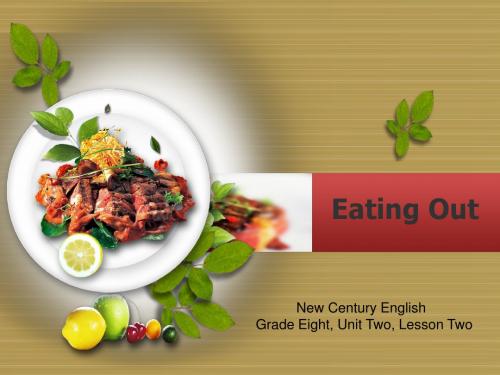
DRINKS
Mineral water/ Beef/ coke /Sprite 80p
MAIN COURSES
Smoked fish £ 4.75 Steak (speciality) £3.20 Chicken £ 3.00 Roast beef £ 3.50
Fruit juice (orange/apple) £ 1.20
• start – starter start = begin start = set out = set off start to do sth. = start doing sth. = begin to do sth. = begin doing sth. soup onion soup / tomato soup / mushroom soup waiter / waitress
How would Helen like the steak? How much does the meal cost? Who pays the bill? Who leaves the tip?
so …that ……
• The digital TV set is very expensive. • Linda got up very late. • The teacher spoke very fast. • The waitresses serve people very well. • She practised playing the violin very hard. • The lecture was very interesting. • She didn’t catch the early bus. • It attracted a lot of people. • I can’t afford it. • She got first prize in the contest. • We couldn’t understand him. • The customers often praise them.
八年级仁爱英语上册u2t2知识点
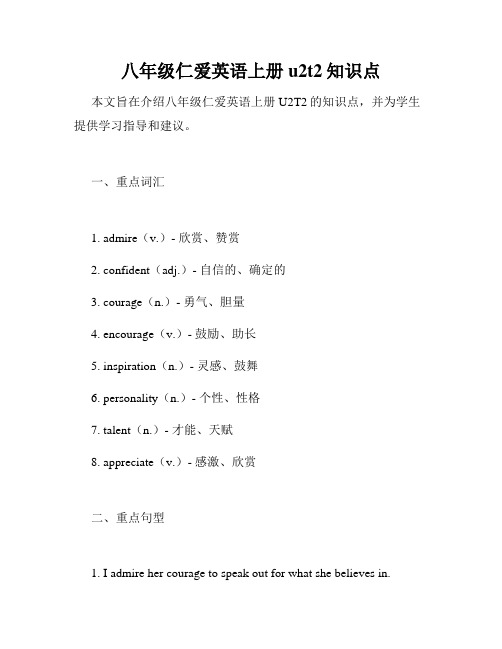
八年级仁爱英语上册u2t2知识点本文旨在介绍八年级仁爱英语上册U2T2的知识点,并为学生提供学习指导和建议。
一、重点词汇1. admire(v.)- 欣赏、赞赏2. confident(adj.)- 自信的、确定的3. courage(n.)- 勇气、胆量4. encourage(v.)- 鼓励、助长5. inspiration(n.)- 灵感、鼓舞6. personality(n.)- 个性、性格7. talent(n.)- 才能、天赋8. appreciate(v.)- 感激、欣赏二、重点句型1. I admire her courage to speak out for what she believes in.(我钦佩她为捍卫信仰而勇敢发声。
)2. She is confident that she can pass the test.(她有信心可以通过考试。
)3. Don't be afraid to make mistakes. You can learn from them.(不要害怕犯错。
你可以从中学习。
)4. He encouraged me to pursue my dreams.(他鼓励我追逐我的梦想。
)5. The sight of the beautiful sunset was an inspiration to the painter.(美丽的日落景象激发了画家的灵感。
)三、语法知识1. 介词的用法介词是一种连接词,用来表达名词、代词或动词与其他词语之间的关系。
介词常常被用来表示时间、地点和方向等,如:in the morning(在早上)、at school(在学校)、toward the park(朝公园的方向)等。
2. 形容词的比较级和最高级形容词的比较级用于比较两个事物的大小、程度或属性等,通常在形容词后加-er,如:bigger(更大的)、smarter(更聪明的)等。
仁爱英语八年级U2T2综合复习讲义
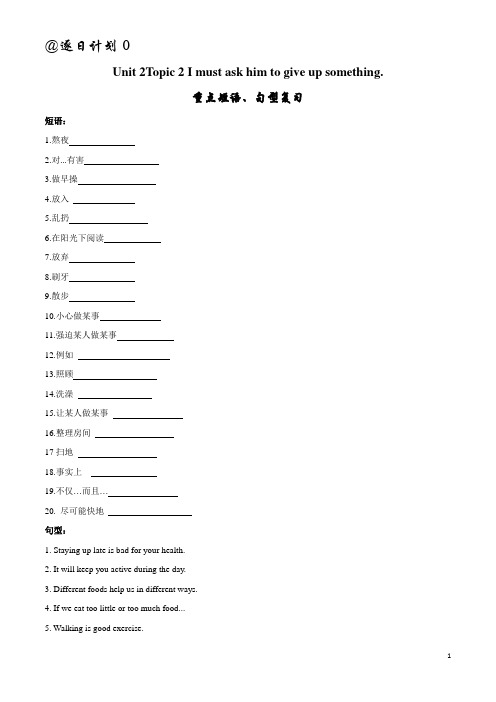
Unit 2Topic 2 I must ask him to give up something.重点短语、句型复习短语:1.熬夜2.对...有害3.做早操4.放入5.乱扔6.在阳光下阅读7.放弃8.刷牙9.散步10.小心做某事11.强迫某人做某事12.例如13.照顾14.洗澡15.让某人做某事16.整理房间17扫地18.事实上19.不仅…而且…20. 尽可能快地句型:1. Staying up late is bad for your health.2. It will keep you active during the day.3. Different foods help us in different ways.4. If we eat too little or too much food...5. Walking is good exercise.6 Playing basketball is good for your health.7 Reading in bed is bad for your eyes.知识精讲1. What’s up?= What’s happening ? = What’s wrong? = What’s the matter/trouble? 怎么了?2. Staying up late is bad for your health.(1) stay up = sit up熬夜, 如:we stayed up until midnight to see the New Year coming.(2) 动词ing形式(动名词)可直接放句首作主语,谓语动词用单三形式。
.看太多电视对我们的身体健康是没有好处的。
is not good for=is bad for.做早操对我们的身体是有好处的。
3. too little 太少;too much 太多;都用来修饰不可数名词。
仁爱英语八年级上册U2T2SC教案设计
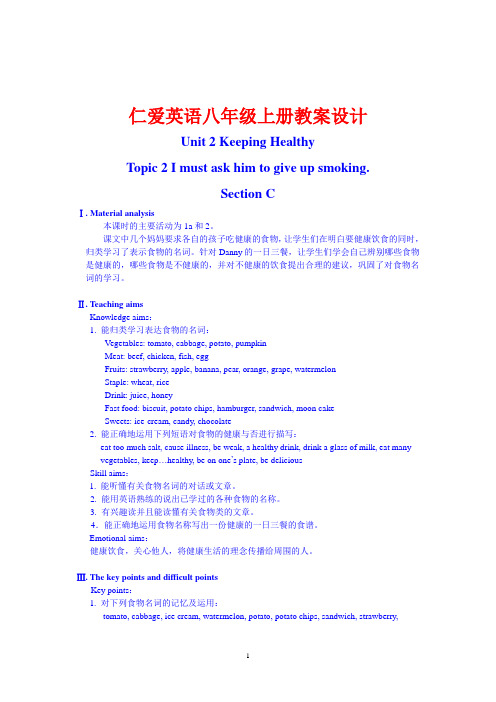
仁爱英语八年级上册教案设计Unit 2 Keeping HealthyTopic 2 I must ask him to give up smoking.Section CⅠ. Material analysis本课时的主要活动为1a和2。
课文中几个妈妈要求各自的孩子吃健康的食物,让学生们在明白要健康饮食的同时,归类学习了表示食物的名词。
针对Danny的一日三餐,让学生们学会自己辨别哪些食物是健康的,哪些食物是不健康的,并对不健康的饮食提出合理的建议,巩固了对食物名词的学习。
Ⅱ. Teaching aimsKnowledge aims:1. 能归类学习表达食物的名词:Vegetables: tomato, cabbage, potato, pumpkinMeat: beef, chicken, fish, eggFruits: strawberry, apple, banana, pear, orange, grape, watermelonStaple: wheat, riceDrink: juice, honeyFast food: biscuit, potato chips, hamburger, sandwich, moon cakeSweets: ice-cream, candy, chocolate2. 能正确地运用下列短语对食物的健康与否进行描写:eat too much salt, cause illness, be weak, a healthy drink, drink a glass of milk, eat many vegetables, keep…healthy, be on one’s plate, be deliciousSkill aims:1. 能听懂有关食物名词的对话或文章。
2. 能用英语熟练的说出已学过的各种食物的名称。
3. 有兴趣读并且能读懂有关食物类的文章。
八年级英语上册Unit 2 How often do you exercise Secti

e
d
c
b
a
b
a
d
ceΒιβλιοθήκη fRole-play the conversation.
A: How often do you drink milk, Liu Fang?B: I drink milk every day.A: Do you like it?B: No. But my mother wants me to drink it. She says it's good for my health.
1d. Listen again. Fill the blanks in the survey.
Question Tina Bill1. How often do you exercise? ________ ________2. How often do you eat fruit? ________ ________3. How many hours do you sleep every night? ________ ________4. How often do you drink milk? ________ ________5. How often do you eat junk food? ________ ________6. How often do you drink coffee? ________ ________
every day
hardly ever
every day
never
nine
nine
three or four times a week
every day
never
two or three times a week
(完整)八年级英语(上)U2T2检测试题仁爱
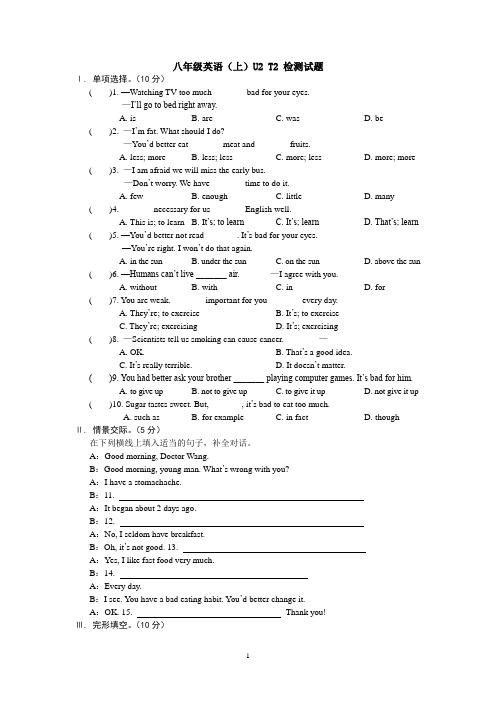
八年级英语(上)U2 T2 检测试题Ⅰ. 单项选择。
(10分)( )1. —Watching TV too much _______ bad for your eyes.—I’ll go to bed right away.A. isB. areC. wasD. be( )2. —I’m fat. What should I do?—You’d better eat _______ meat and _______ fruits.A. less; moreB. less; lessC. more; lessD. more; more( )3. —I am afraid we will miss the early bus.—Don’t worry. We have _______ time to do it.A. fewB. enoughC. littleD. many( )4. _______ necessary for us _______ English well.A. This is; to learnB. I t’s; to learnC. It’s; learnD. That’s; learn( )5. —You’d better not read _______. It’s bad for your eyes.—You’re right. I won’t do that again.A. in the sunB. under the sunC. on the sunD. above the sun( )6. —Humans can’t live _______ air. —I agree with you.A. withoutB. withC. inD. for( )7. You are weak. _______ important for you _______ every day.A. They’re; to exerciseB. It’s; to exerciseC. They’re; exercisingD. It’s; exercising( )8. —Scientists tell us smoking can cause cancer. —_______A. OK.B. That’s a good idea.C. It’s really terrible.D. It doesn’t matter.( )9. You had better ask your brother _______ playing computer games. It’s bad for him.A. to give upB. not to give upC. to give it upD. not give it up( )10. Sugar tastes sweet. But, _______, it’s bad to eat too much.A. such asB. for exampleC. in factD. thoughⅡ. 情景交际。
[全]仁爱版八年级上英语U2T2重点单词短语句型(附例句)
仁爱版八年级上英语U2T2重点单词短语句型(附例句)【重点单词】tired adj.疲倦的,疲劳的['taɪəd]I feel so tired. Let's have a rest!我觉得很累。
让我们休息一下吧!cause v.使发生,引起,导致n.原因,起因[kɔːz]What is the cause of this?这是什么原因呢?litter n.废弃物,垃圾v.乱丢杂物['lɪtə]Littering is a bad behavior.乱扔垃圾是一种不好的行为。
We should throw the rubbish/litter into the dustbin.我们应该把垃圾扔进垃圾箱。
dustbin n.垃圾箱['dʌstbɪn]The dustbin is used to hold rubbish.垃圾箱是用来装垃圾的。
fingernail n.指甲[ˈfɪŋɡəneɪl]My sister likes to have long fingernails.我妹妹喜欢留长指甲。
meal n.一餐(饭)[miːl]Chinese are used to three meals a day.中国人习惯了一日三餐。
without prep.没有,缺乏;不和……在一起[wɪ'ðaʊt]Without your help, I would not have finished the difficult task.没有你的帮助,我不可能完成这项艰巨的任务。
article n.文章;物品;冠词[ˈɑːtɪk(ə)l]Lu Xun's article is too difficult to understand.鲁迅的文章太难理解了。
smoke v.吸烟;冒烟;n.烟[sməʊk]My father has quit smoking for three years.我父亲已经戒烟三年了。
仁爱版英语八年级上册u2知识点
仁爱版英语八年级上册u2知识点在仁爱版英语八年级上册中,第二单元的内容主要是关于“家庭和家居”的话题。
本文将会为大家详细介绍该单元所包括的知识点。
一、家庭成员和家务活动这一部分的重点是介绍各种家庭成员以及家务活动,例如:1.家庭成员:父亲、母亲、儿子、女儿、祖父、祖母等。
2.家务活动:洗碗、打扫卫生、洗衣服等。
通过学习这一部分,学生可以了解不同家庭成员的角色和职责,进而了解家庭的重要性。
二、家庭住宅和家居用品这一部分将介绍家庭住宅和各种家居用品,例如:1.家庭住宅:公寓、别墅、传统房屋等。
2.家居用品:床、沙发、电视、烤箱等。
通过学习这一部分,学生可以了解不同类型的住宅和各种家居用品,更好地了解生活环境和日常用品。
三、日常生活和社会礼仪这一部分将介绍日常生活中的问题和社会礼仪,例如:1.日常生活:起床时间、饮食习惯、运动等。
2.社会礼仪:问候语、礼仪习惯、交际场合等。
通过学习这一部分,学生可以了解如何处理日常生活并掌握社会礼仪的知识,更好地适应社会和参与社会活动。
四、家庭和谐和家庭价值观这一部分强调家庭和谐以及家庭的重要性,例如:1.家庭和谐:积极沟通、相互理解、互相扶持。
2.家庭价值观:人际关系、道德价值、文化传承等。
通过学习这一部分,学生可以了解家庭的重要性以及如何在家庭关系中处理问题,同时将其家庭价值观应用到实际生活中。
综上所述,仁爱版英语八年级上册u2知识点主要涵盖家庭和家居话题,包括家庭成员和家务活动、家庭住宅和家居用品、日常生活和社会礼仪、家庭和谐和家庭价值观等方面的知识。
通过学习这些知识点,学生可以更好地了解家庭和日常生活,提高自己的社会适应能力。
八年级上册英语u2t2的知识点
八年级上册英语u2t2的知识点在八年级上册英语中,课程的第二个单元是U2T2,本文将会介绍该单元的知识点。
一、语法:现在进行时态现在进行时态是表示现在正在进行的动作。
现在进行时的构成是“be”动词加上动词-ing形式。
例如:1. They are playing basketball in the park.(他们正在公园打篮球。
)2. She is singing a song in her room.(她正在房间里唱歌。
)二、词汇:关于体育运动的词汇体育运动是U2T2的重要主题之一,因此需要学习一些与体育运动相关的词汇。
例如:1. basketball 篮球2. soccer 足球3. volleyball 排球4. swimming 游泳5. skating 滑冰6. skiing 滑雪7. running 跑步8. cycling 骑自行车三、听力:辨认数字在U2T2中,有一个听力任务是辨认数字。
这是一个非常实用的技能,因为在日常生活中,数字无处不在,例如购物、计算时间、电话号码等等。
因此,学生需要掌握如何听懂数字。
例如:1. 数字的发音需要清晰准确。
2. 在听到数字时,需要注意将其与其他单词区分开来。
3. 练习辨认数字可以通过听新闻、听录音、听自己朗读数字等方式。
四、口语:询问时间和日期在英语里询问时间和日期是一个基本口语技能。
在U2T2中,学生需要学习如何询问时间和日期,并能够用英语回答。
例如:1. What time is it?(现在几点了?)2. It’s 8:30.(现在8点半。
)3. What’s the date today?(今天是几号?)4. It’s December 1st.(今天是12月1日。
)五、阅读:阅读体育主题的短文在U2T2中,学生需要阅读许多体育主题的短文,例如有关足球、篮球和游泳等。
通过阅读这些短文,学生可以掌握相关的词汇和语法知识,同时也可以了解到不同体育运动的规则和技能。
Unit2重要知识点牛津译林版英语八年级上册
8A U2【wele】1.have to &must[have to]:“必须,不得不”,强调客观上的需要,有人称,时态的变化(三单has to,过去式had to,将来时will have to),其否定形式为don't/doesn’t/didn’t have to,表示“不必”[must]:“必须”,强调主观意愿和看法,无人称,时态和数的变化,其否定形式为mustn't,表示“禁止,不允许”2.It's like watching TV,but there are fewer advertisements.它(上学)就像看电视,只不过广告少一些。
①like prep.像... +名词/代词/ving②fewfewer +可名复③few ;a few;little;a little区别3.British n.英国人the British=British people=Englishmanadj.英国的British people4.vacation 可数名词/不可数名词“假期”(英:holiday)on vacation在度假take a vacation度假winter/summer vacation寒假/暑假5.fall n秋天(英:Autumn);瀑布vi.落下;跌倒6.movie n.(可数) 电影(英:film)go to a movie/go to the movie看电影6.Shall we go together?“Shall we do......?”提建议的句型➡肯定回答:Why not?/OK./Of course./All right.【提建议的句型】Let’s do sth.You'd better do sth.(你最好做某事)How/What about doing sth?Why not do sth?Why don’t you do sth?Will/Would/Could you please do sth?(请你做下某事好吗?)7.practise vi/vt. 练习,训练practise (doing) sth (英:practise)n.练习(英:practice)【reading】1.in year 8在八年级(英:in Grade 8)在...年级:美in Year +基数词in the +序数词+year英in Grade +基数词in the+序数词+grade2.mix vt.混合➡mixed adj.混合的➡mixture n.混合物3.Among all my subjects,I like French best.①like...best=favourite②France n.法国➡French ①n.法语②adj法国的Frenchman法国人4.Learning foreign language is fun.①learning foreign language 动名词短语,起名词作用(指学外语这件事),后面的谓语动词用单数。
- 1、下载文档前请自行甄别文档内容的完整性,平台不提供额外的编辑、内容补充、找答案等附加服务。
- 2、"仅部分预览"的文档,不可在线预览部分如存在完整性等问题,可反馈申请退款(可完整预览的文档不适用该条件!)。
- 3、如文档侵犯您的权益,请联系客服反馈,我们会尽快为您处理(人工客服工作时间:9:00-18:30)。
Unit 2 Why don ’t you talk to your parents? Section B
初三备课组 1. 知识目标:so that, although 引导的状语从句。
2.能力目标:学会谈论问题和给出建议。
3. 情感目标:学会照顾自己,培养自己的独立意识。
重点提示:1. Why don ’t you do sth?学会向他人征求建议。
2. 情态动词could 和should 的用法,并
能够运用它们提出建议。
Preview the textbook from P13to P16,and try to find out the following phrases and write them down.
1.做运动_____________________
2.玩电脑游戏 _____________________________
3.给我许多压力 __________________
4.和某人竞赛 ______________________________
5.在周末\工作日 ____________________
6.进入好的高中__________________________
7.删除 _______________________ 8.疲惫的孩子们________________________
9.直到…才________________________ 10. 快速吃饭__________________________
11.送孩子们去各种班_________________ 12.和…做比较____________________________
13.对孩子的发展有益____________________ 14.有时间放松_________________________
15.知道许多压力_____________________ 16.继续做某事___________________________
17.寻找不同和相似点________________ 18.从小开始学习____________________
19.依我看来 20. 保持一直做某事 ____________________________
21. 再等一些天 22. 做一些安静的事情________________
23.考试技能__________________
1. 他们许多人在学习考试技能以便于进入好的高中,之后好的大学.
____________________________________________________________________________________
so that 意为“以便……,为了……”,引导目的状语从句, that 从句中常使用can / may 等情态动词.
2. 他们总是和其他孩子做比
较.____________________________________________________________
1.短语准备
2.知识点准备
学习目标
be always doing sth. 意为“总是做某事”,always与进行时连用时,常表达说话人的某种情绪,如赞扬、不满、责备等。
3. 根据课文内容填空。
These days, children are sometimes _____ on weekends than weekdays because they ______ take so many __________ classes. Cathy Taylor believes that the after-school activities are _________ for his children’s future. He really want them to be _______.
Linda Miller says, “In some f amilies, __________ starts very young and _______ until the kids get older. The parents are always _________ their small kids with other children. It’s _____.” She thinks that people shouldn’t ____ their kids ______.
Dr. Alice Green says all these activities can _____ a lot of _____ for children. She says, “Kids should have time to _____ and ________ themselves, too. ________ it’s normal to want _________ children, it’s even more _________ to have _____ children.”
小试牛刀
根据句意和首字母提示填空。
1. My parents give me a lot of p______ about school.
2. I had a f______ with my parents.
3. I have to c______ with my classmates at school.
4. I like to s_____ time alone to lower my stress.
5. I’d like to h____ out with my friends on weeke nds.
6. ---I don’t have a partner to play table tennis with.
— Why _____a sports club to practice a lot?
A. don’t join
B. not joining
C. not to join
D. don’t you join
7. 根据中文意思完成句子。
很抱歉今天不能陪你去购物,明天怎么样?
I’m sorry I can’t go shopping with you today. __________________ tomorrow?
8. —Would you like to watch the movie with me tonight?
— ______, but I have too much homework to do.
A. I’d love to
B. That’s all right
C. It doesn’t matter
D. Not at all
9. — Susan, what are the advantages of MP5 players?
— Mom, they are smaller and lighter, ___ they can be carried very easily.
10. — Simon has difficult in ________________ (与……相处得好) his new classmates.
11. No man in the desert would ever refuse ______ the people in trouble and give them food and water.
A.help B.helps C.helping D.to help。
